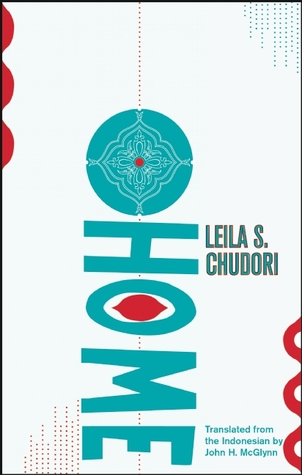The book centers on an Indonesian political exile Dimas Suryo, occasionally shifting perspective but focused in its first half on his new life in Paris (with brief flashbacks to his youth in Indonesia). In the second half, the focus shifts to his half-French daughter Lintang, who is effectively forced to confront her muddled background by her university advisor. Though the change felt abrupt when it occurred, Lintang soon overtook her father in terms of being an engaging and interesting narrator. Her story unfolds more traditionally and echoed in my mind for weeks after I finished the book.
There were moments in the first half of Home that felt simply like history lessons, recited for the sake of memorializing still ignored atrocities. Other moments felt like Cultural Lessons, though some of them oddly enough went largely forgiven by the narrative (for example: the scene in which Lintang's professor condescendingly advises her to talk about her Indonesian heritage for her thesis, as though this is all she is allowed to be - exotic).
Still, it was hard to ignore the power of the story. Dimas' anxiety over having left his homeland behind is a familiar story for those who have read enough immigrant fiction (or... those who have lived it), similarly it's hard not to feel strongly for him when he thinks about the torture and suffering left behind. The book also doesn't shy about the political ramifications even in exile, where the restaurant Dimas and his friends found is viewed as "subversive" for Indonesian nationals, and even the next generation (like Lintang) as suspect.
Home shifts gears in Lintang's section, becoming a very different sort of novel. If the first part is a classic exile/expat novel, the second is a classic return-from-diaspora story. Lintang reluctantly acknowledges her need/desire to visit the "homeland", and once there is drawn into the intricacies of daily life. She meets the children of her fathers' friends, she meets her cousins, she discovers the stain her father's name still carries (and its real-world implications on her family), and she falls into a comfortable sort of pattern. Plotwise, this part of the story was a bit too predictable in my mind, but it worked well enough and didn't drag down the narrative.
It's in this final section that Chudori also introduces Segra Alam, the son of Dimas' former lover and friend. Alam is a familiar sort of man, with a common enough sort of subversiveness and rebellion (in a subversive and rebellious group of friends). His narration usually simply complements Lintang's, but he also serves as a mouthpiece for the more liberal and frustrated youth: "[H]istory is owned not just by the power holders but also by the materialistic middle class who cuddle up to them." There's a bitterness to his narration which contrasts Lintang's more expansive view, and though I didn't necessarily love his sections, I appreciated the way they fit together with the larger story.
Ultimately, Home is an interesting and powerful novel, one worth reading and thinking over. It's a book that lingers in your consciousness, not to mention the way the characters seem unwilling to leave your mind even weeks after reading. I truly felt as though Lintang and I were close friends, and for several days after finishing Home I could hear her voice ringing in my head. The writing is clear and straight-forward, without much overemphasis or exoticism. Even as there were plot points I felt were lacking or characters that weren't developed enough (particularly near the end), I found that I liked the flow of the novel. I also liked the somewhat open-ended way the novel closed, though I recognize that many readers might walk away somewhat disappointed.
The one great flaw, however, is the edition, which is riddled with copy errors. Every few pages I felt myself thrown out of the story by a missing quotation mark or comma or period. At first I thought, "okay, it's just a few..." but then it kept repeating itself. However much I liked the content, I can't pretend that my reading experience wasn't somewhat tainted by this. One or two mistakes are to be expected. Dozens? Not so much.
Even so, I can comfortably recommend Home. This is a well-written and interesting account not only of Indonesian history, but of the exile and diaspora experiences as a whole. Well-written (if poorly edited) with intensely drawn characters, Home is a strong novel well worth your time.
The one great flaw, however, is the edition, which is riddled with copy errors. Every few pages I felt myself thrown out of the story by a missing quotation mark or comma or period. At first I thought, "okay, it's just a few..." but then it kept repeating itself. However much I liked the content, I can't pretend that my reading experience wasn't somewhat tainted by this. One or two mistakes are to be expected. Dozens? Not so much.
Even so, I can comfortably recommend Home. This is a well-written and interesting account not only of Indonesian history, but of the exile and diaspora experiences as a whole. Well-written (if poorly edited) with intensely drawn characters, Home is a strong novel well worth your time.


No comments:
Post a Comment
Anonymous comments have been disabled due to an increase in spam. Sorry!